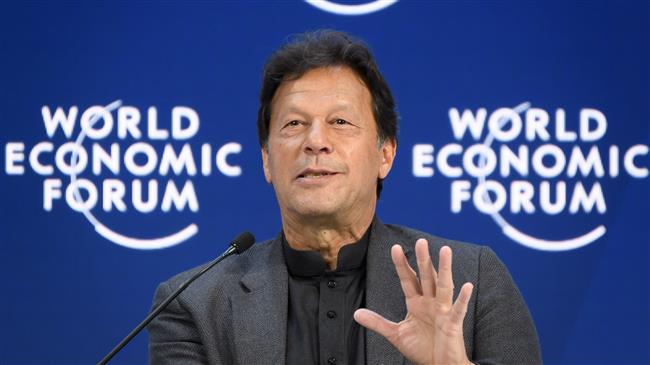Pakistani Prime Minister Imran Khan has warned the world of the danger of an all-out war over the disputed Kashmir region, urging the international community to intervene.

"If something goes wrong, it will have implications far beyond the subcontinent. India is going the wrong way and it is my duty to inform a forum that was set up after World War II to prevent a war from happening anywhere. Elsewhere, there is no danger of war like in Kashmir," Khan said on Friday.
The disputed region of Kashmir has been split between India and Pakistan since their partition in 1947. The two countries have fought three wars over the territory.
Khan also said India has violated the UN resolutions by revoking the Muslim-majority Himalayan regionís autonomous status, adding that over 8 million innocent Kashmiris have been under siege since the plan was announced last August.
Since then, tensions have been soaring between the two nuclear-armed neighbors.
After the decision on the special status, New Delhi dispatched thousands of additional troops to the Himalayan region, declared a strict curfew, shut down telecommunications and internet services, and arrested political leaders and pro-independence campaigners.
Indiaís behavior drew criticism from the people of Kashmir and Pakistan as well as human rights groups and the UN.
In the wake of the move, Pakistan expelled the Indian ambassador, halted bilateral trade, and suspended cross-border transport services.
India and Pakistan also exchanged heavy fire across the militarized de facto border in the disputed Kashmir valley.
The Pakistani premier further touched on Indiaís new controversial citizenship law that is widely considered anti-Muslim.
This is not just about Kashmir, he said, adding that around 20 million Muslims are in danger of being declared illegal.
The law, backed by Prime Minister Narendra Modiís Hindu nationalist Bharatiya Janata Party (BJP), allows granting citizenship to the millions of migrants who legally or illegally came into India from Pakistan, Bangladesh, or Afghanistan before December 2014 - but not if they are Muslims.
Critics say the law will be used in conjunction with a citizenship list that could require all Indians to produce documents proving their origins, a challenge in a country where many people lack official records, including birth certificates.
Muslims fear the new law may be misused to strip them of their citizenship. The ruling BJP, however, argues the law has nothing to do with the countryís Muslims, but aims to help those suffering alleged religious persecution in the neighboring countries.
Relations between the nuclear neighbors nosedived in February 2019, when over 40 Indian paramilitaries were killed in a bomb attack in Kashmir. New Delhi blamed Pakistan-based militants, but Islamabad denied any involvement.
India regularly accuses Pakistan of arming and training militants and allowing them to cross the restive frontier. Pakistan strongly denies the allegation.
In addition, Pakistan and India have routinely tested ballistic missiles since they first became nuclear capable in 1998 and 1974, respectively.
Neither of the neighbors has signed the Non-Proliferation Treaty (NPT) or other international regulatory pacts that restrict developing or testing nuclear weapons.
LINK: https://www.ansarpress.com/english/13225
TAGS:






























 online news tv
online news tv




